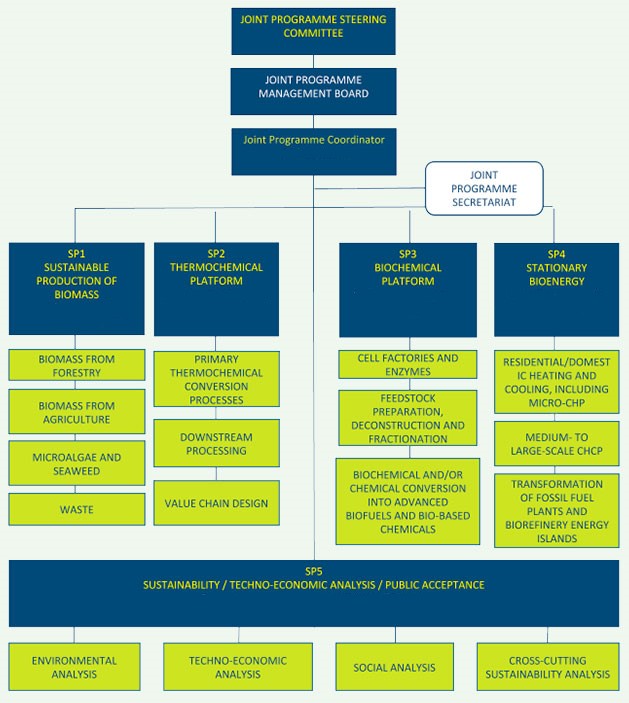DEVELOP
To develop a framework for the better understanding, the exchange of information and human resources, and the discussion of opportunities for collaboration.
To develop a framework for the better understanding, the exchange of information and human resources, and the discussion of opportunities for collaboration.
To align research activities within EERA institutes to give a techno-scientific basis for further development of advanced biobased fuels, power and heat routes and to foster the possibilities for joint technology development.
To have an advisory role to SET-Plan and to the industrial sector about biomass and biobased fuels, power and heat research priorities for the middle to long term.
To enforce an efficient collaboration with the industrial sector as well as with the related European Technology and Innovation Platforms (ETIPs), and to achieve the interest and the mobilization of national resources to support the development of the Joint Programme activities.
To promote an open discussion and analysis of the most realistic research and development alternatives to develop sustainable biobased fuels, power and heat.
To boost collaborative research between the members of the Bioenergy Joint Programme and with other Joint Programmes members’, as well as other external partners outside EERA, in order to develop research and development projects that support the Joint Programme activities and the Joint Programme impact.
To develop and establish international cooperation on bioenergy in all it forms (power, heat and biofuels).
To promote infrastructures sharing (including the creation of new ones) and scientist mobility in order to achieve a more efficient and relevant use of the research resources.


Myrsini Christou (Center for Renewable Energy Sources and Saving – CRES)
> Coordinator: Dr. Wolter Elbersen (Wageningen University & Research – WUR)
Aims at maximizing biomass resources for conversion plants, with the security and flexibility of supply, biomass quality, environmental sustainability, and reducing the costs of biomass feedstocks as the main challenges to be addressed.
To reach these goals, SP1 is divided into the following four R&D areas:
· Biomass from forestry
· Biomass from agriculture
· Microalgae and seaweed
· Waste
> Coordinator: Berend Vreugdenhil (TNO)
Aims at increasing the efficiency, sustainability (lower GHG emissions) and cost-competitive production of advanced biofuels and bioenergy carriers from biomass through thermochemical processing. Research areas are identified for the development of primary thermochemical conversion processes, downstream processing and advanced biofuel and intermediate carrier value chains.
To reach these goals, SP2 is divided into the following three R&D areas:
· Primary thermochemical conversion processes
· Downstream processing
· Value chain design
> Coordinator: Dr. Marcelo E. Domine (Institute of Chemical Technology – ITQ (UPV-CSIC))
Aims at improving the technology and developments in biochemical and chemical processes and technologies for producing advanced biofuels, mainly including aviation and maritime fuels, and the eventual co-production of other bio-based chemical products in biorefinery approaches from all fractions of lignocellulosic biomasses; the biogas from anaerobic digestion; the syngas obtained from thermochemical biomass and bio-waste processing; and the hydrogen from biological and renewable origin.
To reach these goals, SP3 is divided into the following three R&D areas:
· Cell factories and enzymes
· Feedstock preparation, deconstruction and fractionation
· Biochemical and/or chemical conversion into advanced biofuels and bio-based chemicals
> Coordinator: Berend Vreugdenhil (TNO)
Aims at upgrading the development of efficient, flexible, affordable and environmentally friendly heat, power and cooling production from biomass. It covers all plant scales, from small residential/domestic units to medium- to large-scale bioenergy plants focusing on the conversion of woody biomass, especially important for the residential sector, and low-grade feedstocks/residual streams through combustion and gasification technologies.
To reach these goals, SP4 is divided into the following three R&D areas:
· Residential/domestic heating and cooling, including micro-CHP
· Medium- to large-scale CHCP
· Transformation of fossil fuel plants and biorefinery energy islands
> Coordinator: Raquel S. Jorge (Norwegian University of Science and Technology – NTNU)
Aims at creating a robust tool to tackle issues like the analysis of the environmental sustainability, based on relevant policy requirements, and the techno-economic analysis of bioenergy technologies and value chains, as they are essential for the successful implementation of Bioenergy.
The evaluation of social acceptance, as an indicator of the sustainability, and the determination and definition of measures, conditions and frameworks to foster the deployment of Bioenergy systems are two important purposes of this new Subprogramme.